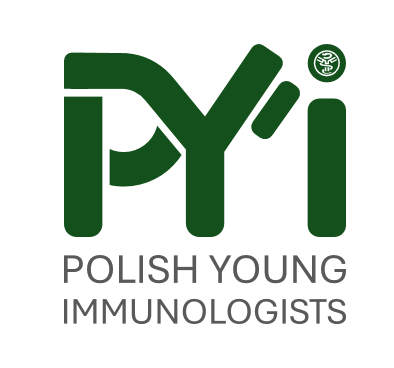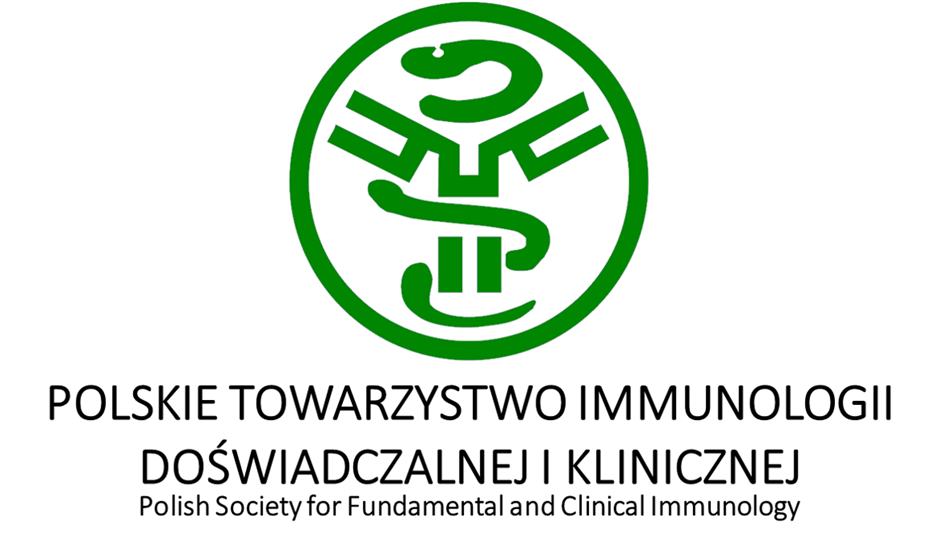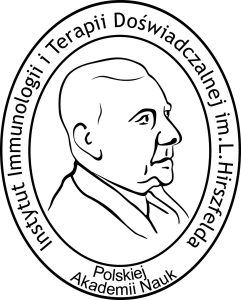This year’s conference marks the inaugural event organized by the Polish Young Immunologists, designed specifically for early-career researchers and specialists in the field of immunology. Our goal is to create an environment that fosters new connections, facilitates encounters with inspiring colleagues, and encourages collaborations that may develop into long-term initiatives. We aspire for this conference to become a recurring event that, year after year, brings together an increasingly broad community of participants and provides a platform for the exchange of experiences and the integration of young immunologists.

The section was founded in December 2024. The members of the Board for the first term are:
President: Filip Lewandowski (Szczecin)
Vice-president: Ewa Oleszycka (Krakow)
Board Member: Nicole Kryniecka (Wroclaw)
Secretary: Wiktoria Grzybowska (Wroclaw)
How to Become a Member of the Polish Young Immunologists (PYI PTIDiK)
Becoming a member of the Polish Young Immunologists (PYI) is easy and open to anyone passionate about immunology. Membership is available for:
-
Undergraduate and graduate students
-
PhD candidates
-
Early-career researchers
-
In special cases, high-school students over 18
-
Any young enthusiast of immunology
Because the PYI Section operates within the Polish Society for Experimental and Clinical Immunology (PTIDiK), every member of PYI must also become a member of PTIDiK.
Below are the steps to join:
Step 1 – Fill in the PYI Membership Form
First, complete the official PYI application form:
https://docs.google.com/forms/d/e/1FAIpQLScHx-YTrTr1zCPv2-Xti8xN5MOkc8gukZZrizpXcO_gkMF_fw/viewform
Step 2 – Indicate Your Areas of Interest
Fill out the second form to tell us what activities you would like to engage in within the Section:
https://docs.google.com/forms/d/e/1FAIpQLSdLCoHpN9CycCDoZmZID1Rgz9aLccu8uvhReXcGHaDS4zU5lw/viewform
Step 3 – Apply for PTIDiK Membership
Download and complete the PTIDiK membership declaration form:
https://drive.google.com/file/d/1KuzLJeFco91vW2GeyAnMEDd1ux-zToYJ/view
Send the form to your local PTIDiK branch (contact details can be found on the PTIDiK website https://ptidik.pl/o-nas1/o-nas).
If you have questions about membership, you can also write to: pyi@ptidik.pl
Step 4 – Pay the Annual Membership Fee
Membership in PTIDiK costs only 40 PLN per year for members under 35 years old.
Transfer 40 PLN to the following account:
Santander Bank Polska S.A.
Account number: 52 1090 2688 0000 0001 3186 7007
Payment title: Name and surname, Polish Young Immunologists Section, year
Step 5 – Join the PYI Communication Platform
Download Slack, our main communication tool.
All internal announcements, opportunities, projects, and discussions take place there.
If something interests you, just write to the group – the Board will help you get involved.
Stay Connected
Follow us on social media:
-
Facebook: Polish Young Immunologists
-
Instagram: @polish_young_immunologists_pyi
-
X (Twitter): @PYI_PTIDiK
-
LinkedIn: Polish Young Immunologists
We look forward to welcoming you to the PYI community!

The Polish Society of Fundamental and Clinical Immunology (PTIDiK) brings together researchers and clinicians working in the field of immunology, fostering collaboration between experimental and clinical disciplines.
Its main goals include supporting scientific research, promoting education in immunology, organizing conferences, workshops, and seminars, as well as encouraging the development of young scientists. PTIDiK also cooperates with national and international scientific organizations to strengthen the exchange of knowledge and experience.

Hirszfeld Institute of Immunology and Experimental Therapy, Polish Academy of Sciences
Institute of Immunology and Experimental Therapy was founded in 1952 by the Polish Academy of Sciences. The main founder and the first director of the Institute was Professor Ludwik Hirszfeld, famous Polish immunologist and microbiologist. Professor Hirszfeld shaped the scientific profile and activity of the Institute for the coming years. He established the Polish school of immunology and was the pioneer of a new scientific discipline – seroanthropology.
Thereafter the leadership of the institute was taken over by Professor Stefan Ślopek, a specialist in medical microbiology and immunology. He explored the therapeutic applications of bacteriophages, including their use in treating sepsis and conducted pioneering research on therapies for infectious diseases of the gastrointestinal and respiratory systems, as well as on the process of phagocytosis.
Thanks to his long-term dedication, the new institute building at 12 Czerska Street (now 12 Rudolfa Weigla Street) was constructed, and since 1975 it has served for the Ludwik Hirszfeld Institute of Immunology and Experimental Therapy.
Professor Andrzej Gamian currently serves as Director of IITD PAS, as well as Head of the Department of Medical Biochemistry at Wrocław Medical University and the Department of Infectious Diseases Immunology of IITD PAS. He is renowned for his research on bacterial antigens and polysaccharides, which provided the basis for the development of innovative diagnostic tools and vaccines. Professor Gamian is a co-developer of the meningococcal type B vaccine and several broad-spectrum antibacterial conjugate vaccines.
The Institute is a leading research center in immunology, experimental oncology, microbiology, immunochemistry, glycobiology and medicine – with a focus on civilization diseases, new drugs and vaccines, and regenerative medicine, and with a proven track record of implementation and commercialization of the results.
The Institute’s activities are carried out by 23 laboratories or research facilities, in close cooperation with integral units such as the Medical Center (with the Phage Therapy Center), the Polish Collection of Microorganisms (PCM, WFCC no. 106), the Cell Line Collection, and the NeoLek Laboratory (innovative medical technologies).
The Institute boasts excellent research equipment, an advanced animal facility, and several research-supporting units. To enhance its collaboration with industry and facilitate the commercialization of scientific discoveries, the Institute established the Technology Transfer Centre Ltd.
The Institute engages in extensive scientific cooperation, clinical and implementation projects, and international exchanges and it upholds certifications for good practices. These activities connect the Hirszfeld Institute with numerous organizations and institutions, fostering a global network of collaboration.
Hirszfeld Institute is internationally recognized for its longstanding research on bacteriophages. In response to the growing problem of antimicrobial resistance, the Institute established the Phage Therapy Unit (PTU). The Institute maintains validated methods for phage isolation and for preparing phage formulations for therapeutic use. Phage preparations developed at the Institute have been used within coordinated treatment programs in Polish hospitals to address a variety of acute and chronic bacterial infections. The PTU has paved the way for compassionate and experimental applications of phage therapy in modern medicine and has materially shaped contemporary knowledge on the therapeutic use of bacteriophages in EU. Today the phage therapy unit concentrates on treating infections caused by bacterial genera including, but not limited to, Staphylococcus, Escherichia, Pseudomonas, Klebsiella, and Acinetobacter.
About Wrocław
Wrocław is the capital of Lower Silesia and one of the oldest cities in Poland, ranking as the country’s third most populous urban center. Situated on the Odra River, the city encompasses 112 bridges and 12 islands.
The Old Town has preserved its medieval street layout. Thanks to its distinctive city plan, as well as its numerous branches of Odra, moats, bridges, and green areas, the historic core of Wrocław constitutes an important architectural and urban complex. It is home to numerous monuments, including an exceptional concentration of Gothic churches and the remarkable medieval Town Hall. By the 13th century, Wrocław had already emerged as one of Europe’s prominent cities, and today, the Market Square still remains the vibrant heart of the city, ranking among the largest in the continent.
Lower Silesia is a dynamic and diverse area in southwestern Poland, featuring varied landscapes such as the Sudeten Mountains in the south, rolling hills, fertile plains, and numerous rivers, with Odra being the most prominent. The region is known for its well-developed infrastructure, thriving economy, research, and culture.
Beyond its rich history and impressive architecture, Wrocław is also home to leading academic and scientific institutions, including the University of Wrocław, Wrocław Medical University, Wrocław University of Science and Technology, and the University of Environmental and Life Sciences. The University of Wrocław is one of the largest and oldest universities in Poland, while Wrocław Medical University is highly regarded in international rankings for its research and education.
In the post-war era, Wrocław became a thriving academic center in Poland. Among the distinguished Polish scientists were Professor Hugo Steinhaus, one of the founders of modern mathematics, who established the Wrocław school of mathematics; Professor Rudolf Weigl, inventor of the first effective typhus vaccine; and Professor Andrzej Górski, an immunologist and pioneer of phage therapy. Their achievements helped shape Wrocław’s reputation as a center of innovation and scientific excellence in Central Europe.
Organizers and academic partners
Scientific Committee of ImmunoBridge
- Prof. Paulina Niedźwiedzka-Rystwej (general chair)
- Prof. Katarzyna Bogunia-Kubik
- Prof. Andrzej Gamian
- Prof. Andrzej Siwicki
- Prof. Urszula Demkow
- Prof. Anna Chełmońska-Soyta
- Dr hab. Bogumiła Szponar
- Dr Ewa Oleszycka
Organizing Committee of ImmunoBridge
- Mgr Nicole Kryniecka (general chair)
- Mgr Filip Lewandowski
- Dr Ewa Oleszycka
- Wiktoria Grzybowska
- Mgr Hubert Kasprzak
- Lidia Bronowska
- Katarzyna Skurnica
- Zuzanna Pochwała
- Milena Klodek
- Angelika Maj
- Mgr inż. Karolina Rusewicz
- Mgr Julia Depta
- Mgr inż. Jakub Smoliński
- Mgr Martyna Cieślik
- Zuzanna Dolińska
- Agata Skupień
-
Patrycja Kwiecińska
-
Iga Wnuk
-
Mgr Natalia Rzepka